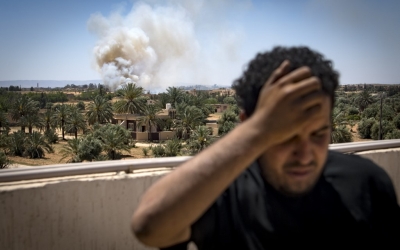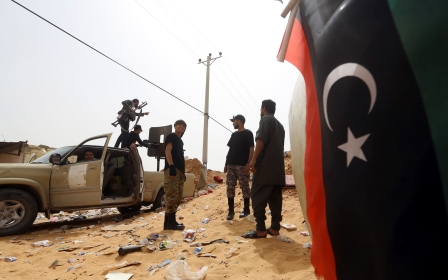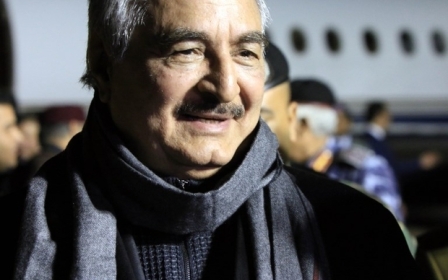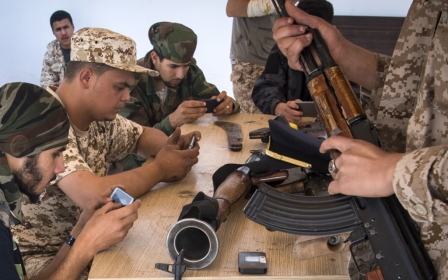'We have to go': Libyans flee Tripoli as Haftar pushes for Ramadan offensive
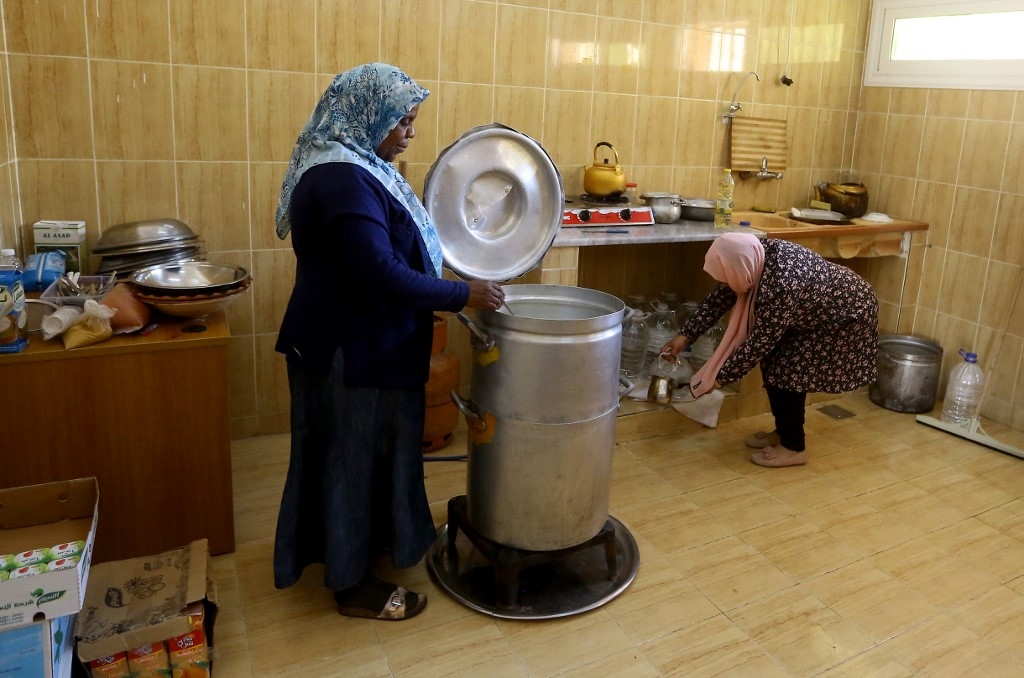
It could be a normal weekday in Ain Zara. There are apples and bananas, potatoes and courgettes, arranged outside the shops, waiting to be sold in this district in southwest Tripoli.
But the shops are shuttered and homes have been emptied as families like Osama Oshah’s flee eastern commander Khalifa Haftar’s offensive on the capital, leaving behind a shell of a neighbourhood, deserted in a flash.
'We have to go away. We still don’t know where, but we have to leave'
- Osama Oshah, Tripoli resident
“We have tried to stay, but we are afraid of Haftar’s bombing,” said Oshah from his car, loaded with large boxes and bags, with a woman and two children inside. “We have to go away. We still don’t know where, but we have to leave.”
A month ago, Haftar launched his offensive to conquer Tripoli and, as he claims, to free the capital from terrorists as he says he did in Bengazi and Derna. It is the umpteenth battle after nearly five years of civil war.
Forces loyal to the UN-backed, Tripoli-based Government National Accord (GNA) have gathered in the capital in response.
New MEE newsletter: Jerusalem Dispatch
Sign up to get the latest insights and analysis on Israel-Palestine, alongside Turkey Unpacked and other MEE newsletters
More than 350 have been killed, including at least 22 civilians, and more than 2,000 have been wounded, according to the UN. Some 50,000 residents have been displaced as fighting has wrought damage and death through farming areas and neighbourhoods in southern Tripoli like Ain Zara.
In a few days, said Oshah from his packed car, it will be Ramadan. “I hope it is a short war. I pray that it will be a short war,” he said. On Sunday, the United Nations called for a week-long humanitarian truce.
But on Monday, the start of the Muslim holy month, Haftar urged his troops in an audio recording to fight harder to take the capital in the coming weeks.
"Officers and soldiers in our armed forces and the auxiliary forces, I salute you in these glorious days and urge you with your strength and determination to teach the enemy a greater and bigger lesson than the previous ones, as we've always known you to do, till we uproot it from our beloved land," Haftar said.
'We don't know where to hide'
Many of the 50,000 displaced from Tripoli have managed to take refuge in the homes of relatives and others have rented other houses in the city. But for many, the only option is to live in schools, which are sheltering hundreds of other displaced families.
'Six months have passed and we are here again to count the dead'
- Ahmed Elgillay, displaced Tripoli resident
It is difficult for journalists to talk to many of those who are displaced. Some have families in eastern Libya and fear retaliation if they speak out or are embarassed by their situation. Many are angry after years of war.
“The last war was in September. Six months have passed and we are here again to count the dead,” said Ahmed Elgillay, who now lives in a classroom with his wife in the capital’s Al-Farraj area, south west of Tripoli.
“We live constantly in fear. We have hoped for the last eight years that things would get better and, instead, every day we have to hope that something serious and brutal does not happen,” he said.
“What will happen if Haftar bombards the city? We don't know where to hide, we are not dangerous, we are not terrorists. If he is really intent on doing here what he did to Derna and Benghazi, it will be a massacre, a bloodbath. This is what we fear.”
Oshah has similar fears. Some of his family is still in Benghazi where Haftar launched an operation in 2014 to drive out militants and other opponents and declared victory in July 2017.
Critics say the commander labelled enemies as Islamist militants in order to justify the fighting. Oshah tells of a city that has been destroyed and partially razed to the ground by bombs after the three-year war.
"Haftar is just propaganda. He says he has an army, that the Libyan army in his hands will free Libya and unite it. Those troops are neither an army nor above all they are Libyans. They are mercenaries, paid by him or sent by his allies,” said Oshah
“Haftar says he wants to free Libya from terrorists, but he just wants to conquer the ministries for his personal interests and those of the countries that support him.
"An army that wants to unite the country does not kill people, it protects them. And Haftar is killing us and terrorising the population with bombings, fighter jets.”
Osama gets out of the car, points around his neighbourhood. Everything is closed, shutters lowered and every few metres on the ground, there is a deep hole, left by bombs dropped by forces loyal to Haftar, explained Moath, a pro-GNA soldier patrolling the street.
“It happened ten days ago. There were our vehicles around here,” said Moath, who said he preferred not to use his last name for security reasons, pointing to an area in the street.
“Two days later, people with white flags came out of the road. We were cautious. We thought they were civilians and we wanted to save them.
“Instead, they were his men. They wanted to ambush us, but we took them.”
Suddenly, an ambulance pulled up, the kind used by the field hospitals for wounded soldiers and civilians. Inside, a man was being taken from his home on the front line. His face was hollow and he didn't seem to have eaten for days, and was barely speaking. The soldiers planned to take him to the first hospital in the city.
Osama shook his head and returned to his car. "We have had enough, we are tired of war,” he said, and drove away.
Middle East Eye delivers independent and unrivalled coverage and analysis of the Middle East, North Africa and beyond. To learn more about republishing this content and the associated fees, please fill out this form. More about MEE can be found here.


